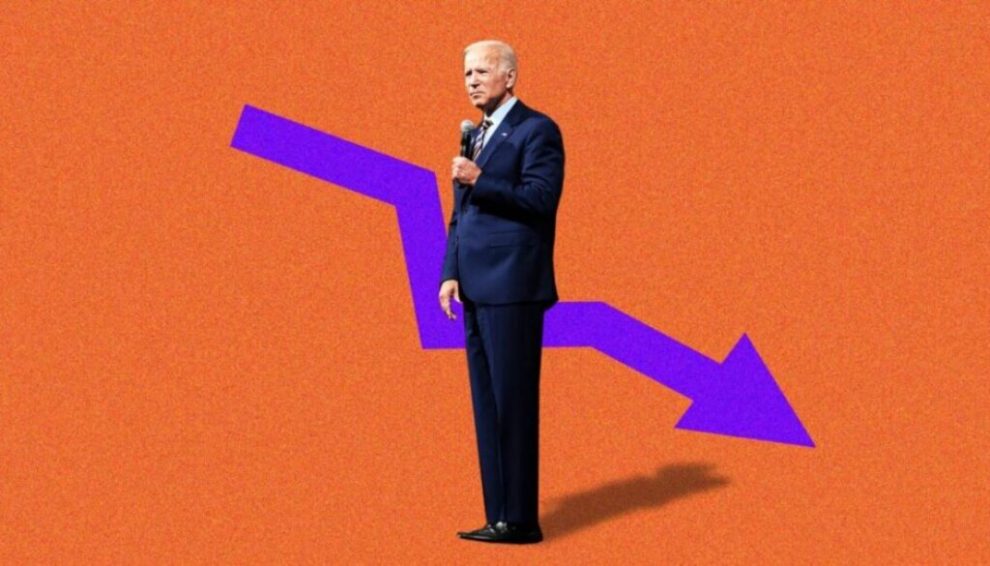We are living through the era of unpopular presidents.
Just nine months into his term, President Joe Biden has already achieved something only predecessor Donald Trump managed before him: an average approval rating south of 45 percent in the third quarter of his first year.
According to an Oct. 1-19 Gallup poll of 832 American adults released today, Biden was at 42 percent overall, down from 57 percent in January. Trump at this juncture was at 37 percent, on his way to becoming the least popular president in the modern polling era, never cracking 50 percent in the Gallup survey even once.
These numbers reinforce the modern political theory of negative polarization, in which major-party blocs are defined by what they oppose, and factional leaders from the other tribe are at best unloved and more routinely despised.
But there’s an additional interpretation hiding in numerical plain sight, one that has direct implications on two mostly separate political discussions taking place this month—the Democratic struggle to pass Biden’s multi-trillion-dollar domestic agenda, and the revived debate on the right over electoral strategizing in the post-Trump era. Both sets of arguments could benefit from absorbing the fact that Biden, since inauguration, has lost a stunning 27 percentage points among self-described independents, tumbling from 61 percent approval all the way down to 34 percent.
“It’s a real problem for Biden that the most moveable group of voters now largely disapproves of the job he is doing as president,” wrote Geoffrey Skelley Thursday at FiveThirtyEight.
Skelley continued:
Biden’s sharp decline among independents also seems related to what has often been Americans’ number-one concern since Biden took office: the COVID-19 pandemic. This has surely hurt Biden with most groups of Americans, but independents’ dissatisfaction with Biden’s handling of the pandemic has been particularly pronounced. In early June, almost 60 percent of independents approved of Biden’s response to the coronavirus, but that has now fallen to just below 42 percent, according to FiveThirtyEight’s coronavirus approval tracker.
Independents are also especially dissatisfied with how Biden is handling the economy….[T]heir approval on that issue fell from the low 40s in June to around 30 percent more recently.
Gallup measures “independents” differently than other pollsters, with numbers far more bountiful than voting records or party registration would indicate. The company since 1988 has been asking the same question: “In politics, as of today, do you consider yourself a Republican, a Democrat or an independent?” In every poll since 2013 the number-one answer has been “independent,” reaching an all-time high of 50 percent in February of this year, before ticking back down to the low 40s (Democrats and Republicans were tied at 29 percent apiece in the most recently reported survey).
“The percentages identifying as independent in 2020 and thus far in 2021 have been unusually high compared with prior presidential election and odd-numbered years,” the company reported in April.
Pundits and pollsters have disagreed over the years about the significance of this bloc, with skeptics pointing out that most people who self-describe as independent nonetheless vote predictably for a given political party, while enthusiasts counter that weak party affiliation is a potential precursor to a more dynamic and less harmful politics.
But independents have an outsized influence on matters involving the current and former presidents in particular. That’s because without those partisan free agents, Donald Trump, who won the cohort over Hillary Clinton in 2016 by one percentage point, might still be president.
Though non-Republicans might still have a hard time believing it, Trump after a tumultuous four years in office actually won more of the national popular vote in 2020 than he did in 2016, 46.9 percent compared to 46.1 percent. But what sealed his fate was the collapse of the independent and third-party vote, from a combined 5.7 percent to 1.8 percent, and the transference of much of that support to the Democratic nominee. Biden improved by 3.1 percentage points over Clinton, with surveys showing that people who in 2016 voted Libertarian or Green or Constitution overwhelmingly preferred the non-Trump Democrat.
Having helped get him the job, independents never did cotton on to President Trump, starting at 42 percent approval, dipping to 29 percent in August 2017, peaking at 47 percent at the onset of the COVID-19 pandemic in April 2020, before finishing at 30 percent. These numbers closely mirrored the president’s overall approval rating, since Republicans stood by their man to a historical degree and Democrats just seethed his entire term. (Similar dynamics are at play with Biden.)
As went Trump, so did Trump’s party, which during his administration alienated fence-sitters enough to turn them against Team Red. As Sen. Bill Cassidy (R–La.) said this week, “President Trump is the first president―in the Republican side at least―to lose the House, the Senate and the presidency in four years. Elections are about winning.” And Republicans on the national level the past four years have not been winning among independents.
Yet that may soon change. Because the two-party system works like a pendulum, with the centralization of executive power and attention making much of politics a referendum on the sitting president, the independent anti-vote is likely to defrock Democrats in the 2022 midterms.
“If Biden is struggling to win independents and Hispanics, that could snuff out any hope Democrats have of holding either chamber of Congress,” Skelley wrote. “After all, independents backed Democrats in the 2018 midterms and Biden last November, and even though Republicans made gains with Hispanics in places like Texas’s Rio Grande Valley, Hispanics still largely backed Biden and helped him win in key swing states, like Arizona. But if Republicans can capitalize on Biden’s weakness among these groups, that could be their ticket back to controlling Congress next year.”
As an exasperated-sounding president tries to piggyback trillions of dollars’ worth of vast new government expansions onto the trillions of dollars of vast new government expansions he (and his predecessor) already shoved through, all while lying so brazenly about the allegedly zero-dollar cost that MSNBC anchors are snorting on air, he would do well to remember that his winning electoral coalition included millions of people who do not like that kind of stuff. As I wrote after the election in November:
To the extent that ex-Libertarian voters pulled the lever this time for Biden, it wasn’t because of his proposals on spending, taxes, regulation, Section 230, the Supreme Court, or a hundred other things. If there is any libertarian case for Biden, it’s situational, and that situation ends on January 20. All foolish talk of a “mandate” should include a clause about how the former vice president probably couldn’t have gotten over the hump without Gary Johnson’s voters. Good luck keeping those types in the coalition.
But independents turning on Biden is not some kind of get-out-of-jail-free card for Trump. While it’s early yet to talk about 2024, all polls point to Republicans pining for the erratic and polarizing 45th president to become the 47th. If party hacks and think-tank Trumpists convince themselves that independents are going to finally learn to love this distinctly dislikable politician, they will get what they deserve.
Story cited here.























